softly-gazes
48 posts
Sideblog dedicated to storing thoughts about images (actually just a Jimin blog, he has unfathomable power over me, like who am I gazing at, softly? Jimin. It's jimin)
Don't wanna be here? Send us removal request.
Text
whhehe how did i not know that Jimin did a letter live??? posted three days ago?? what goes on???
been thinking about him
youtube
4 notes
·
View notes
Photo
Hdjddhd this is PEAK no nonsense Yoongi like "yeah sure I've seen a ghost, i don't really give shit tho, they're probably cool idk" someone free him

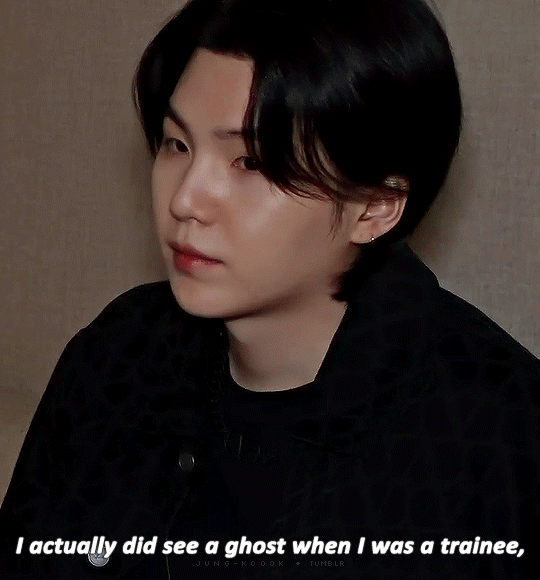
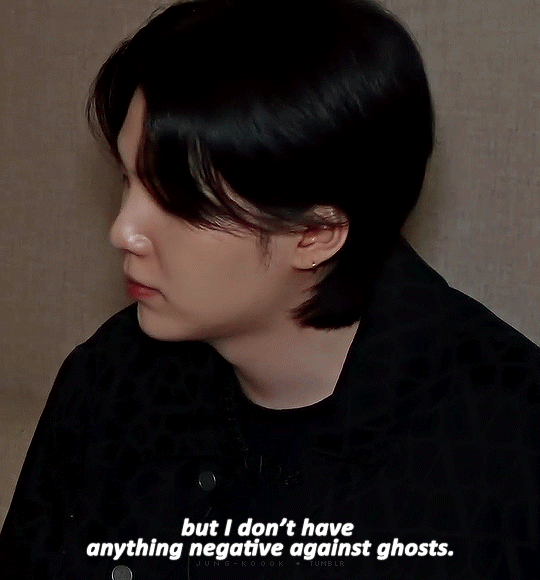
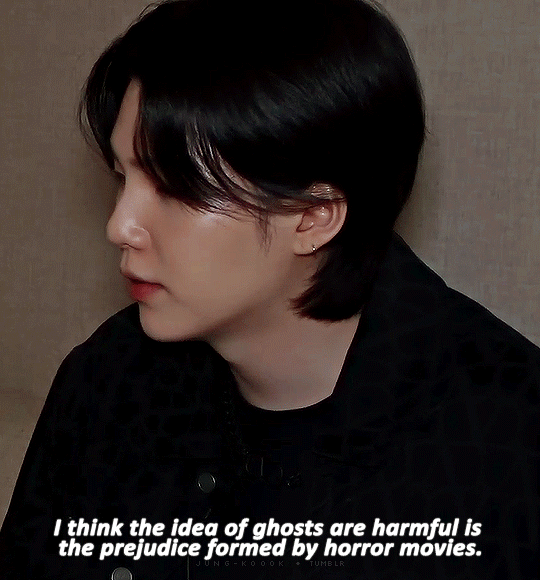
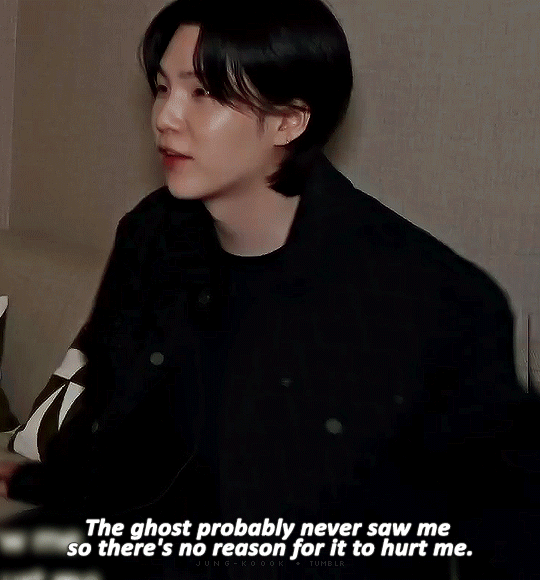
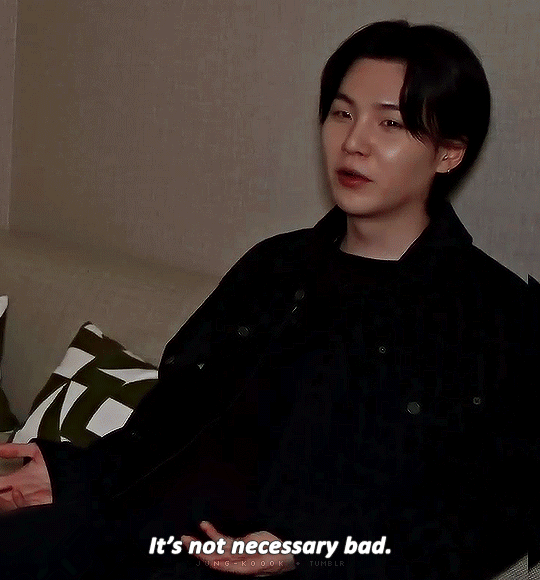

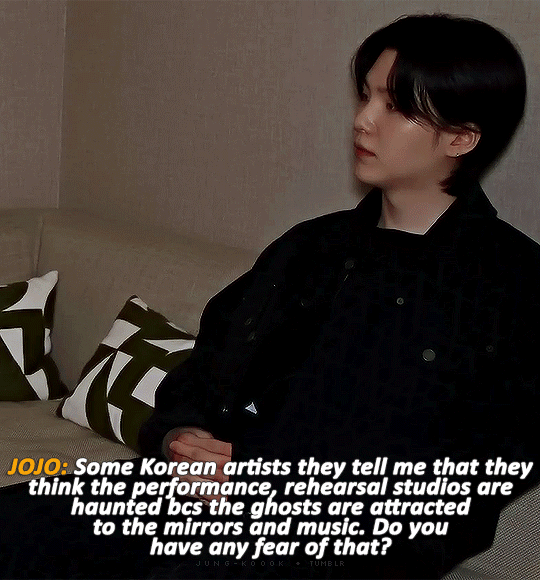

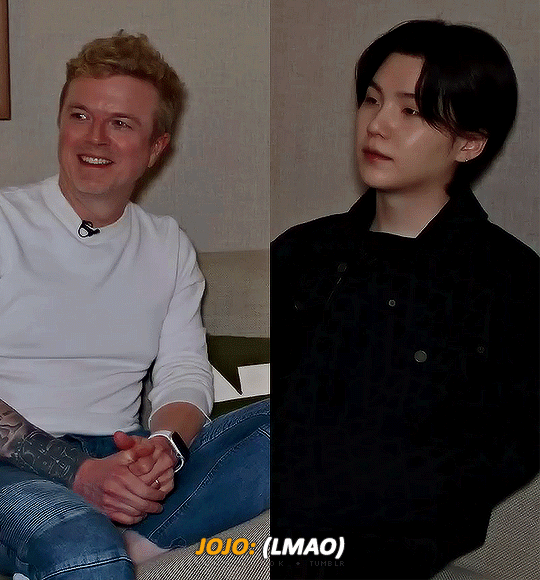
just yoongi defending ghosts lmao 😂
3K notes
·
View notes
Text
*sighing wistfully* sometimes i think about the Robert Mapplethorpe pants. Sometimes, it's the voice acting episode where the senior voice actor gave him specifically shenzi and judy hopps to play. Because his voice 'sounds more androgynous.' And how i can't know what goes on in his mind and what he thinks about these things. I can only project and try to turn my gaze back to myself
4 notes
·
View notes
Text
Jimin: *peacefully not at met gala, probably having nice time somewhere else*
Me, as if I am a clueless 1960s industry insider finding out over the phone: Speaking. What's that? He didn't attend?? Mhm. Oh no, darling I think we were spared. Yes, quite. The anticipation was far too great, a simple suit would've caused riots in the streets! What? They might've had something else lined up this time? Darling, don't make me laugh! They hardly have that poor boy's best interests at heart, you saw how bare his ears were for the Tiffany`s reception. Not a single diamond! For Tiffany?! Good god. Mhm. Yes, well, don't we all? I have to go now, darling, my afternoon cigarette appointment awaits. Keep me informed, won't you? Yes, you too. Au révoir, dear.
6 notes
·
View notes
Text
They're gonna put him in another monochrome suit, aren't they? I'm gonna succumb to my imagination and fantasize about all the fabulous ensembles he could show up in, and then sigh, beleaguered, when I inevitably wake up to him walking the carpet in real estate agent cosplay again. I want justice.

4 notes
·
View notes
Text
I should not be saying any of this, but I have this persistent fantasy that once bts reunites after military service, we will get a mature, raw, bold and introspective album like none other before it. Specifically about their various individual experiences being away from the spotlight and in the socially unique structure of the military. That would be controversial. So much so that I don't actually think they'll do it, it would be too touchy of a subject for an idol group. And perhaps too personal for themselves as well. But good god, wouldn't it be a deliciously triumphant return for the social issue group??
0 notes
Text
looking back at all of yoongi's releases with the knowledge we have of him is so funny bc this man keeps going on about how he thinks about quitting music ten times a day, but he loves this job, but he also kinda doesn't do it for himself anymore, but still it's so much fun etc. but that kind of fraught relationship is not reflected in the scale or quality of anything that he puts out??
like, everything he does is very much go big or go home, from the cinematic magnitude of his music videos to the boldly political lyrics he writes, and now he's going on a three shows a week (back-to-back) solo tour?? with a documentary out and a bunch of other promotional stuff?? he might struggle with his role as artist and entertainer but he sure as hell will go full throttle regardless lmao
10 notes
·
View notes
Text
Ah...why do I feel like Jimin's promotion went by too fast.... I miss him
9 notes
·
View notes
Text
@jigokuhana one of those things where ppl (especially artists) have to rely on capitalism in order to get to a point in their career where they can get away with saying the things that yoongi does (things to make you think & rebel against power) to a VERY wide audience.
im sure yoongi realizes this more than a lot of ppl do. but he’s smart about it~
because if he werent rich & famous, the things he’s saying could easily be stamped out by those more powerful than him. thats the beauty of music & art.
There are many ways of going about anticapitalist action, and this is what he has chosen, which I respect!
2 notes
·
View notes
Text
yoongi is the only rich bitch i would ever let lecture me about the flaws of capitalism
187 notes
·
View notes
Text
Yoongi:
Me, after watching daechwita and haegeum back to back: sir, are you perchance a connoisseur of the cinema? An incidental peruser of the cahiers du cinema, mayhaps? No? *brandishes gun* Drop the act, gimme your letterboxd account NOW
65 notes
·
View notes
Text
Look, i know he's obscenely wealthy, hardly comrade Min, BUT to me, the anti-capitalist tilt to his lyrics is just cool, always has been
Obsessed with him name dropping youtube as a capitalist tool to pacify the masses, despite it being a platform instrumental to his own success???? Hello?? All while living his gangster movie fantasy??? I need to study his brain under a microscope
151 notes
·
View notes
Text
CANNOT believe that yoongi really took this opportunity to essentially say 'fuck the pigs' in music video form????? Absolute mad lad
6 notes
·
View notes
Text
In Daechwita , the king is betrayed by the butcher/executioner
In Haeguem the police officer is betrayed by the telephone informant
And in both Daechwita and Haegeum Yoongi kills himself in positions of authority , who have become corrupt from power , influence and money.
And in both music videos he allies himself with the working class
This isnt even going into the lyrical content.
But its so cool to see him acknowledge again that people need checks and balances in place, and that if they are not serving the public but themselves than they have no purpose and must be eliminated.
And this belief includes to himself as a celebrity and the influence he has on fans.
D-day as an album for visual standards and in the production to certain songs have this focus on Glitches and imperfections. I think that ties in rather neatly with this fear Yoongi evidently has with corruption , and falling prey to that , becoming the bad guy.
In every Agust D music video he is restrained , hands tied behind his back, blindfolded, handcuffed , being pursued , arrested , and judged, and ultimately threatened with his demise.
He also casts himself as the bad guy. Tony montana , the mob boss, the unlawful king, the literal bad cop and this figure is always killed....and comes back again and again to be killed once more and the cycle continues, because Yoongi will always fear that. Being betrayed, betraying others , betraying himself and his beliefs.
Its a gut wrenching self analysis of his psyche and a interesting use of different personas as a musician. Agust d , Suga , Min Yoongi , they serve different purposes for his different musical releases. And this may be the last we see of Agust D, but not the last of what he represents to Yoongi, after all never say never
1K notes
·
View notes
Text
As we get more teasers for D-day, I can't help thinking about how yoongi's approach to this concept is likely from a completely different angle than that of your garden-variety tumblr user's and that's genuinely funny as fuck
like, he's imagining this:



While the fandom's starting point might look a bit more like this:





and that makes me chuckle
1 note
·
View note
Text
One thing I really love about Yoongi is that though his musician persona is very no nonsense and to the point, he has a flair for the dramatic!!
Obsessed with D-day continuing the concept from his previous releases with the little scar over his eye and a kind of underworld/organised crime thing with the suits and the stacks of money on the floor etc. :D
He's having fun!!
5 notes
·
View notes
Text
Like Crazy (2023) as a discussion of (queer) loneliness
hiiii anyways i keep saying Like Crazy is incredibly bisexual/queer and its been hard to explain why without writing an essay so. without further ado:
*DISCLAIMER* I am not claiming I know anything about how Jimin identifies or the intended message of the album, nor am I claiming my interpretation as above any other. This is just my reading of FACE and Like Crazy as a gay person of colour and a grad student writing a thesis on transness where I discuss topics of loneliness as a systemic form of violence and intimacy. I am also looking at this from a very Western perspective; though I know there are likely many Korean and likely queer Korean authors, theorists, and poets evoking similar ideas, I’ll be making reference to authors that I am familiar with who are better known in a Western context.
Loneliness as a cycle of abjection
“I want to introduce Jimin’s true feelings that I didn’t bring up anywhere else. I looked back on myself and honestly expressed my […] emptiness and loneliness.”
I don’t think it would take a particularly high level of analysis to conclude that FACE, and Like Crazy more specifically, are meant to explore loneliness as a process of self-alienation. Non-binary author Olivia Laing describes the cycle of loneliness as one where:
“[…] the lonelier a person gets, the less adept they become at navigating social currents. Loneliness grows around them, like mould or fur, a prophylactic that inhibits contact, no matter how badly contact is desired. Loneliness is accretive, extending and perpetuating itself.”
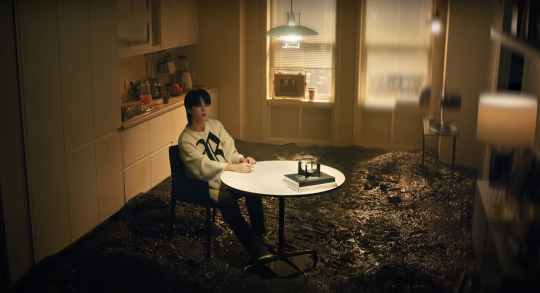
It’s very clear from the beginning of the music video for Like Crazy that Jimin struggles with reconciling a comfort in loneliness with a need to experience intimacy. Regardless of his efforts, the rot of loneliness is never far, seeps in through the walls and stains his hands. As (ironically) relatable of an experience as loneliness is, it does not occur in a vacuum. Rather, the unique experience of queer loneliness and rejection is one riddled by othering from acceptable sexuality and gender experiences and an inability to be framed within normative categories. Robert Phillips, scholar in language analysis as it pertains to gay male sexuality, wrote on abjection through a trans studies framework. To him, the process of horror or unease that defines abjection, through which the “other” is separated from and by an “us,” goes beyond “casting out” and becomes more interactive process; the hegemonic is protected by rejecting whatever does not conform, that is ambiguous, that does not fit in box. “The anxiety at the root of this unease with transgender subjectivity can be traced back, in part, to a fear of the ambiguous.” Loneliness, like queerness, acts as a sort of mark of Cain, a characteristic that becomes so impeded in our being that it if first noticeable and then rejectable.

Despite being marked by loneliness, Jimin is the center of attention for the first act of the music video, featuring him crowd surfing and posing delicately for pictures. Yet, despite his yearning, he makes no move for intimacy. The music video implies the possibility that it is the result of this very hypervisibility as a figure of softness and boyishness, inviting parallels to be made here with the foucauldian references and the power play between surveillance and identity in other areas of the album, namely Set Me Free Pt. 2 (a discussion for another post for another time…..).
Hedonism as an escape
“[Like Crazy] expresses the emotions of the moment when you run away from reality to forget your wounds.”
The overlap between loneliness and overt sexuality is why eroticism is so culturally important to queer communities. Like Crazy explores desire and intimacy through what can be called a queer lens, as an escape and as an unsuccessful means to being perceived and acknowledged outside of suffering. The whole poem is absolutely beautiful, but a specific excerpt of gay Asian-American poet Ocean Vuong’s On Earth We’re Briefly Gorgeous comes to mind: “Don’t we touch each other just to prove we are still here? I was still here once.” As Like Crazy, Vuong’s poem discusses intimacy as the antithesis to loneliness. To be intimate is to come out of ones self. The erotic becomes an avenue to salvation (I will permit myself a little shoutout to Christian mythos by drawing parallel to the Song of Songs - we all dream of kissing God, of laying with the presence of something larger than us, and finding deliverance from it!).
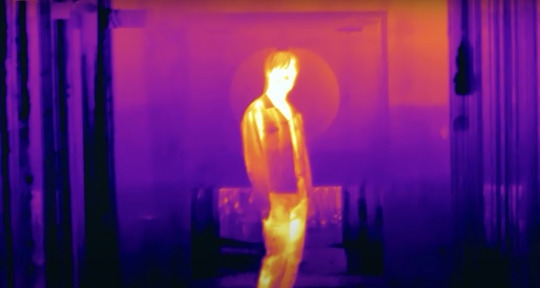
Like Crazy communicates a power struggle between desperation for intimacy and an addiction to loneliness. What Jimin says about it and the juxtaposition with the actual visuals of the music video paints the picture of an attempt to build closeness on the foundations of perpetual solitude. In Like Crazy, closeness is futile. Loneliness becomes a lifelong lover, and intimacy an occasional affair. Though still better than perpetual solitude, it is marked by disillusion: “I’d rather be lost in the light.” Rather than evoke the image of a passionate one-night-stand, it acknowledges of the persistence of loneliness. Tumblr-infamous gay poet Richard Siken evokes this feeling:
“Loneliness, I find, continues too. Our relationship with solitude is one of the most important ones we have in this life. No matter how full and vibrant and loud we make things, the quiet always finds us.”
Despite Jimin’s desires for closeness, we don’t actually see him making any move for closeness. Rather, despite his best efforts, he walks against the course of those around him in a repeated shot before knocking the camera’s lens away; again, a parallel to the surveillance of set me free, as well as a possible denial of him pace against the grain.
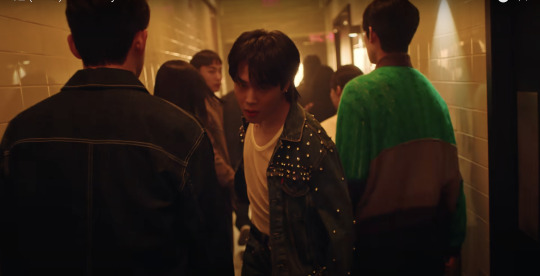
Queer desires and longing
“Let me have a taste / Give me a good ride.”
For non-queer people, what is difficult to understand in the particularities of queer loneliness is its entwining with desire. It’s an unspeakable yearning - as much in the ways it is indescribable as it is often life-threatening to do so. It is a profound sense of non-belonging felt in the knowledge that you are not as others are or see you because of a fundamental issue with how - and for whom - you experience desire. As a result, the erotic and sexuality along the margins of what is normative, i.e. reproductive cisgender heterosexual missionary sex after marriage, are profoundly radical and embodied manifestations of queer desire: kink, bondage, leather, sadomasochism, casual sex, chemsex, etc. all contribute to this expression of queer intimacy and self actualization.

I know I’m being a little dramatic in the set-up here but it is really difficult to try to explain this inherent outcasthood to straight people. It is such a specific experience that is so untranslatable, and yet it is a feeling that I pick up so strongly in the Like Crazy music video. The remedying of sexuality with the profound alienation that queer people feel up until, very often, a dramatic and self-destructive discovery in young-adulthood, is something that straight/cis people just can’t understand. Leading African queer scholar and (erotic) writer Keguro Macharia writes:
“what is the taste of loneliness? / salt-bitter-sweet-nothing / after midnight, in cars, in booths in sex shops, in dark bedrooms, in anonymous hotel rooms, encounter after encounter, trading orgasms for ‘hold me’ and ‘let’s cuddle’ ‘if I suck you off, will you cuddle with me’ ‘if I let you fuck me, will you cuddle with me’.”
I’m not knowledgeable on kink culture so I won’t get too into it but I think it’s really interesting how submissive the lyrics come off. What is striking about the way Like Crazy approaches desire that sets it apart from any generic “we found love in this club”-type pop song is its desperate tone rather than one that boasts virility with promises of a “good time.” Instead, Jimin is the one pleading.
Queer loneliness as liberation
“She’s saying, ‘Baby, don’t think about it / There’s not a bad thing here tonight.”
Like Vuong’s poem, Like Crazy could also become a larger question on a heterosexual culture that is increasingly anxious about bodies and touch. The music video can be clocked as having the intention to discuss the erotic - the Robert Mapplethorpe reference is enough to assert this - yet it does so very tamely. Everyone is clothed, no one touches too much, the atmosphere is fun, chill, controlled. Jimin, despite his expressed desperation for closeness and hedonism as told through the lyrics and through his interaction with those at the party, through the careless throwing back of shots, does not find what he needs. The environment is too controlled, too “straight” (as in “proper,” or “innocuous”). He himself does not find any intimacy. He stays at the center of it all, untouched, and not daring to get closer.
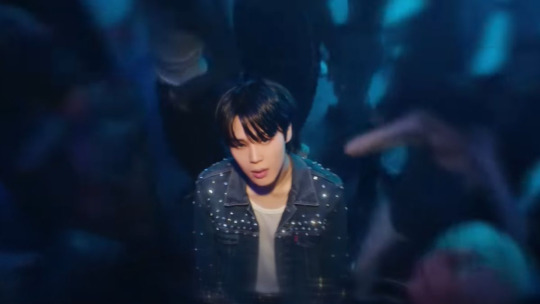
Something that is reflected by a lot of trans theory writers (some whom I’ve read including Paisley Currah and Dean Spade) is that the normalization process in inclusion produces and reproduces ideas on who is and “insider” and who is an “outsider.” I read a bit of Melissa Caroll’s thesis on the political implications of queer loneliness as part of my own (much shorter) thesis. In it she discusses how “straight” culture, through the aforementioned social accounting processes, delimit the realm of the socially accessible, in a process Denise Riley calls loneliness. Caroll says:
“Currently, any public declaration that “I am lonely” presumes that we are registering this feeling based on what we have been led to believe that loneliness, as a term, means: sad, alone, lacking, in need or want of friends, odd, bizarre, queer, and unhappy.”

Heteronormative abjection of queer and trans modes of being are increasingly reclaimed as constructive and disruptive political strategies. As postmodernist feminist scholar Julia Kristeva writes, abjection is “the place where meaning collapses.” Rejection of inclusion to instead embody abjection and loneliness is another cornerstone of queer self-affirmation that is explored, again, through the erotic and the sexually obscene. The tame nature of the music video, Jimin’s desperation, implies a dissociation from himself and a refusal to face himself. There is an acknowledgement of the futility of his desires for closeness beyond what he is “marked” for, that it will “break” him yet he refuses to be “saved.”
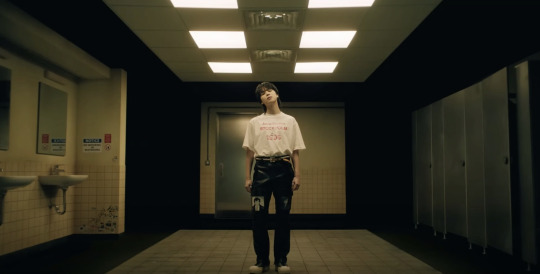
So, regardless of whether Like Crazy truly is an attempt to explore the unique nuances of queer loneliness, it is clear that what it does discuss is struggle against self. The music video depicts not romantic rejection or conflict, but rather an imposed alienation. A self-rejection from an objected self and from a normative way of life. The stained, leather clad hand presumably belonging to Jimin himself dragging him to the party, the knocking away of the camera as a refusal to accept a self or to showcase that “wound,” the interplay between the warm shots of androgyny and desire contrasted with the cool setting of the club. The premise of the music video and its use of a movie itself is a refraction of this longing and abjection in a way; what does it say to attempt to translate a profound feeling of disorientation and loneliness within a normative context through the reference of a romance film featuring a White, conventionally attractive, heterosexual, cisgender, normative couple as a man of colour often read as gender non-conforming?
TLDR: Whether Like Crazy or FACE globally means to discuss queer loneliness and desire, the way they are ultimately explored and the play on gender and belonging imply a framework that is, intentionally or not, queer.
#Good GOD op this was delicious#Wonderful read#Please don't shorten it#My field is film studies so I'm not particularly well-versed in the literature you reference#I would love for you to write more about the research you do#10/10
144 notes
·
View notes